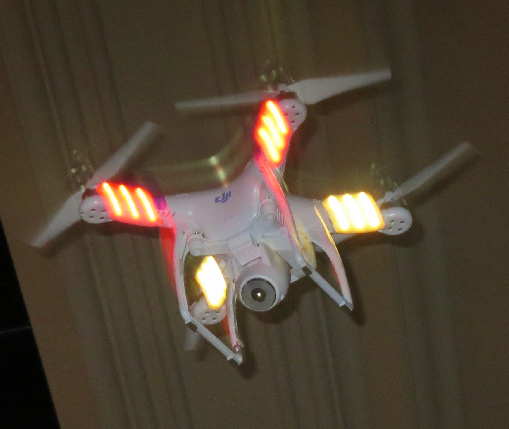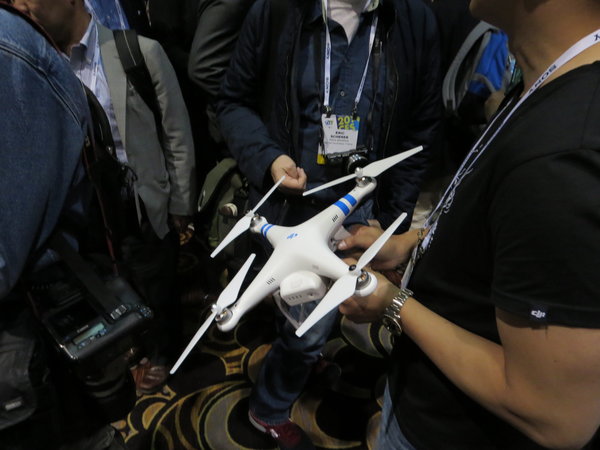aNewDomain.net — At CES 2014 drones were often the stars of the show. But, as with most technology, the drone reality is double-edged. On the one hand, they are great toys that can be neat fun — or for pizza delivery, unmanned landscape filming, or simply flying around in an open field. Our Lamont Wood documented a wide variety of the new creatures at CES 2104.
Despite the fun and games, the other aspect of drones is quite brutal. Robert Gates, in his new book, warns of a joystick-like affinity for modern warfare. Gates says, “For too many people–including defense ‘experts,’ members of Congress, executive branch officials and ordinary citizens–war has become a kind of video game or action movie: bloodless, painless and odorless…” This from Robert Gates’ new book Duty: Memoirs of a Secretary at War — 2014
Medals for Drone Pilots?
The Pilots who are Joy stick operators were supposed to get medals for their work. But Army and veterans of ground battles rebelled. Hagel has withdrawn the Panetta medal recommendations.The so-called “drone medal” are expected to be part of a review of all medals. Former Secretary of Defense Leon Panetta announced its creation last February. It was designed to honor cyber warriors and drone operators but quickly drew fire, mainly for its placement above combat recognitions such as the Purple Heart and Bronze Star with Valor.

Photo credit: Lamont Wood
Dirty Wars, Kill List, and a Wedding
In Yemen, 17 people died during a wedding trip. The caravan was taken out by a drone — one of the many military achievements accomplished with the small drone “toys.” Crashing a wedding this time is not American film comedy. The incident on December 12th in Yemen is anything but comedy.
Hooria Mashour, a senior minister described it:
December 12 was supposed to be a day of celebration for the al-Ameri family. A young bride traveled to her wedding with her relatives in Bayda province, Yemen. But in a few dark seconds their celebrations were eviscerated. A U.S. drone fired at the wedding procession, destroying five vehicles and most of their occupants. Not even the bride’s car, ornately decorated in flowers for the occasion, was spared from the carnage. Senior Yemeni officials later admitted that the strike was a ‘mistake‘.”
Drone Blow Back
The blow-back effect from this and other misfired attempts is huge, politically and on the ground. Even General McChrystal has huge doubts. McChrystal said there is a danger that drones will be used as an “antiseptic.”
There’s a danger that something feels easy to do and without the risk to yourself, almost antiseptic to the person shooting, doesn’t feel that way at the point of impact. And so it lowers the threshold for taking operations because it feels easy, there’s a danger in that,’ he said. ‘And then the other part is there’s a perception of arrogance, there is a perception of helpless people in an area being shot at like thunderbolts from the sky by an entity that is acting as though they have omniscience and omnipotence, and you can create a tremendous amount of resentment inside populations, even not the people that are themselves being targeted, but around, because of the way it appears and feels.’ “
“So I think that we need to be very, very cautions: what seems like a panacea to the messiness of war is not that at all,” he said during an interview with Today, the BBC’s flagship radio show.
In reaction to the global backlash, on January 7th the Obama administration made the highly-unusual move of announcing that it was going to carry out an “internal investigation” of the wedding drone strike. This according to NBC news. Obama knows the technological intelligence (techint) and human spy networks (humint) used in the drone program are far from foolproof. Occasionally mistakes are made that lead to deaths of innocent civilian bystanders.
London-based Bureau of Investigative Journalism has consistently tracked U.S. drone attacks. It recently released a report on the six months following President Barack Obama’s major address on drone warfare before the National Defense University (NDU) last May. In that speech, Obama promised that “before any strike is taken, there must be near-certainty that no civilians will be killed or injured – the highest standard we can set.” The BIJ summarized:
Six months after President Obama laid out US rules for using armed drones, a Bureau analysis shows that covert drone strikes in Yemen and Pakistan have killed more people than in the six months before the speech.

Photo credit: Wikimedia
The Price Paid by Civilians and Children
A new interactive graphic called Out of Sight, Out of Mind, released by Pitch Interactive, has worked to capture the scale and human cost of the predator drone strikes in Pakistan in order to bring a new perspective to the CIA’s nine-year covert program. According to Pitch Interactive founder Wesley Grubbs, the goal was “to try and get people to pause for a moment and consider the issue of drone strikes seriously.” And he did just that.
The chilling graphic starts off with two simple statements: “Since 2004, drone strikes have killed an estimate of 3,105 people in Pakistan,” followed abruptly by “Less than 2% of the victims are high profile targets. The rest are civilians, children and alleged combatants.”
The video takes just two minutes to watch. Please view it here.
The dilemma in this situation is very real. In this case an apparently high-priority suspect on Obama’s “Kill List” was in the convoy and was wounded. Does this make the strike okay or make it right?
The phrase “An Eye for an Eye” used to be commonplace in dealing with terrorism and brutal regimes. But this rule can no longer apply to civilians in the Muslim countries under surveillance.
Jeremy Scahill has been exposing U.S. covert war making for years and has done so most recently in his book and film Dirty Wars. The film was just shortlisted for an Oscar for best documentary. In these wars it has apparently become 100 eyes for an eye — many of them children. The best estimate now is a ratio of 3 civilians for every one person of interest.

Image credit: Jeremy Scahill
As technology advances there will only be more drones. They will be more specialized and prevalent in our culture and world. Where should the line be drawn?
For aNewDomain.net, I’m David Michaelis.
Based in Australia, David Michaelis is a world-renowned international journalist and founder of Link Tv. At aNewDomain.net, he covers the global beat, focusing on politics and other international topics of note for our readers in a variety of forums. Email him at DavidMc@aNewDomain.net.














The use of drones in war seems cowardly to me.